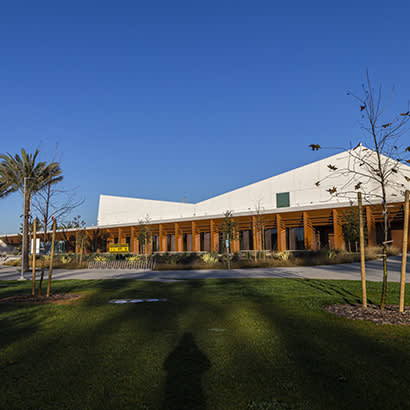
Pictured: The community center at Earvin “Magic” Johnson Recreation Area, which is a green building with a LEED Gold certification. Photo courtesy of Los Angeles County Department of Parks and Recreation.
What is Decarbonization?
Decarbonization refers to the process of reducing carbon dioxide (CO2) emissions resulting from human activities, particularly from the burning of fossil fuels such as coal, oil, and natural gas. Decarbonization can be achieved through various strategies, including transitioning to renewable energy sources (such as solar and wind), improving energy efficiency, adopting clean technologies, and implementing carbon capture and storage techniques.
Decarbonization is a critical component of global efforts to combat climate change and its associated impacts. Local park agencies, through their stewardship of parkland, promotion of sustainable practices, and engagement of communities, play an important role in advancing decarbonization at the local level. By embracing and leveraging their unique position of trust and influence within communities, park agencies can contribute significantly to creating a sustainable, low-carbon future.
Why is Decarbonization Important?
The ultimate goal of decarbonization is to achieve a low-carbon economy, thereby mitigating the adverse effects of climate change, such as extreme weather events, sea level rise, human health impacts, and ecosystem disruption. Decarbonization is crucial for numerous reasons, including:
- Climate Change Mitigation: The accumulation of greenhouse gases, particularly CO2, in the atmosphere is the primary driver of global warming and climate change. Decarbonization helps reduce these emissions, thereby slowing the rate of global temperature rise and reducing the frequency and severity of climate-related disasters, such as heatwaves, hurricanes, floods, and wildfires.
- Public Health Improvement: Burning fossil fuels releases pollutants that contribute to air quality issues, negatively impacting communities, especially those with high densities of children, elderly individuals, and people with preexisting health conditions. Decarbonization involves reducing the burning of fossil fuels, which are major sources of air pollutants such as particulate matter (PM), nitrogen oxides (NOx), sulfur dioxide (SO2), and volatile organic compounds (VOCs). Lower levels of these pollutants can lead to better health outcomes, including fewer respiratory and cardiovascular diseases.
- Biodiversity Conservation: Many ecosystems, including forests, wetlands, and grasslands, are vulnerable to climate change. Decarbonization efforts help maintain the climatic conditions necessary for the survival of these ecosystems and the species they support. Efforts to mitigate climate change can help protect keystone species which have a disproportionately large impact on their environment. Protecting these species helps maintain the structure and function of ecosystems, which is crucial for biodiversity.
- Economic Benefits: Transitioning to a low-carbon economy can create new job opportunities in renewable energy sectors, such as solar and wind power, and in energy efficiency industries. It also reduces the economic risks associated with climate impacts, such as property damage and loss of productivity.
- Energy Security: Decarbonization leads to improved energy security by diversifying energy sources, enhancing reliability, stabilizing prices, reducing environmental and health impacts, fostering innovation, and promoting geopolitical stability. These factors collectively contribute to a more resilient, sustainable, and secure energy system.
What is the Role of Local Park Agencies in Decarbonization?
Local park agencies play a pivotal role in the decarbonization efforts at the community level. As summarized below, their contributions are multifaceted, encompassing environmental stewardship, community engagement, and policy advocacy.
- Carbon Sequestration: Parks and green spaces act as carbon sinks, absorbing CO2 from the atmosphere through trees, plants, and soil. Local park agencies can enhance carbon sequestration by creating additional parkland (including restoring and regenerating degraded lands), planting more trees, preserving natural areas, and restoring wetlands.
- Promotion of Sustainable Practices: Park agencies can lead by example by implementing sustainable practices in how they develop, operate, and maintain parks. This includes using renewable energy sources for park facilities, developing new facilities that are LEED (Leadership in Energy and Environmental Design) certified, retrofitting existing buildings for greater efficiency, utilizing alternative fuel vehicles, promoting energy-efficient infrastructure, and adopting eco-friendly landscaping practices.
- Green Infrastructure Development: By developing and maintaining green infrastructure, such as urban/community forests, green roofs, and rain gardens, local park agencies can help mitigate urban heat island effects, reduce energy consumption, and manage stormwater, contributing to overall decarbonization goals.
- Active Transportation and Recreation: Parks provide spaces and serve as destinations for active transportation modes, such as walking and cycling. By creating and maintaining extensive networks of accessible multi-use trails and recreational facilities, park agencies encourage low-carbon transportation and lifestyles, helping to reduce reliance on motor vehicles and associated carbon emissions.
- Education and Advocacy: Parks serve as community hubs where agencies can inform the public about the importance of decarbonization and sustainable living. Through workshops, programs, and informational campaigns, park agencies can raise awareness and inspire action among community members.
- Policy Influence: Park agencies can advocate for policies and regulations that support decarbonization efforts. This includes supporting land use policies and zoning laws that protect and expand green spaces, advocating for funding for renewable energy projects, and collaborating with other local public agencies to integrate sustainability into broader community or area planning initiatives.
Conclusion
By prioritizing decarbonization, park agencies fulfill their role as environmental stewards, protect public health, and enhance climate resilience. Reducing carbon emissions helps mitigate climate change, improve air quality, protect public health, and conserve biodiversity. Additionally, sustainable practices can lower operational costs, set a positive example for the community, and align with policy and funding opportunities. Through decarbonization, park agencies can help to safeguard natural environments and ensure a sustainable future.
Clement Lau, DPPD, FAICP, is a Senior Analyst with the Los Angeles County Chief Sustainability Office. He was previously a Departmental Facilities Planner with the County’s Department of Parks and Recreation.


